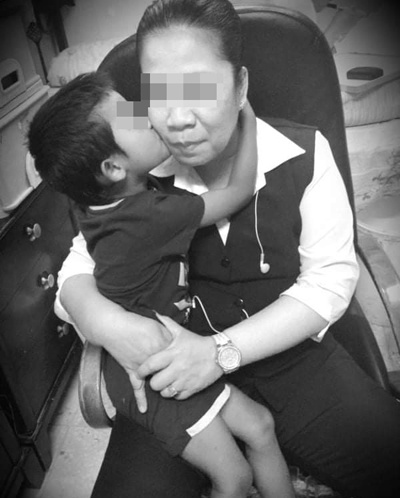
By Ben Garcia
A 10-year-old boy, abandoned by his Bangladeshi father and Filipino mother and raised by another expatriate couple in Kuwait, now faces separation from the only parents he's ever known due to a lack of official documents. Rasoul Haidar's story is a sad, complicated tale of abandonment, illegal residency and uncertainty complicated by the global pandemic.
Haidar was born in Kuwait in March 2010, according to Theresa, the woman who has raised him. Haidar's birth parents both lived and worked in Kuwait. It's unclear if his parents were legal residents at the time and if his birth was registered. According to Theresa, the father was an illegal resident and was deported when Haidar was eight months old.
Haidar's mother, a coworker of Theresa, asked her to watch the boy so she could travel home to the Philippines for a holiday. The boy's biological mother never returned from the 'holiday' and Theresa has looked after the boy ever since. He has become part of her family and she considers him as her son.
But legally, he has no identity, no papers, no birth certificate, no way to be in Kuwait and more importantly, no way to go home with Theresa to the Philippines. This presented only a few problems during Haidar's first years. He is homeschooled by Theresa's daughter and the family live a simple, quiet life.
But now Theresa faces a major difficulty in keeping her family together. Her husband died during the pandemic and she turned 60 this year. She's currently working part-time as a gift wrapper but does not have a full time job, and now her visa has expired. Theresa has lived and worked in Kuwait for 33 years but is ready to return home. She is doubtful that she will be able to renew her residency, since Kuwait announced recently that all those aged 60+ without a bachelor's degree cannot renew work visas after Jan 2021.
"Because of the new law, I want to leave Kuwait, but the problem is my adopted son. My husband's last wish was for me to bring home our adopted son to the Philippines. We have two more children in the Philippines, my eldest, who is now married, and my youngest daughter. I have here with me my other daughter who is working, in addition to our adopted son, whom we treat as part of the family," Theresa said. "If my visa will not be renewed or transferred to a new sponsor this year, I will be illegal in Kuwait while waiting for the resolution of my adopted son's case," she noted.
Theresa has appealed to the Philippines Embassy for help with Haidar's case. She claims his mother gave her the boy's birth certificate and a paper granting her custody prior to leaving Kuwait. However, she's unable to produce these papers and has not been able to locate either the father in Bangladesh or the birth mother in the Philippines.
Without papers, Haidar has been raised illegally in Kuwait. He cannot attend school, cannot visit a doctor or emergency room and cannot leave the country. "He is now 10 years old, and from the time we got him till now, we've been educating him, so he knows how to read and write and identify almost everything. Thanks to social media and devices," Theresa said.
Embassy responds
Kuwait Times inquired at the Philippines Embassy about any possible solutions for Theresa and Haidar. "If the mother of the child is a Filipina and the father is Bangladeshi and both parents are no longer to be found and the adoptive parents don't know their whereabouts, the law says the child cannot be taken to the Philippines regardless of who raised him," a Filipino official told Kuwait Times.
"According to the Geneva Convention on the Rights of the Child, 1961 UN Convention on the Reduction of Statelessness and 1930 Hague Convention on Certain Questions Relating to the Conflict of Nationality Laws - the custody and citizenship of a foundling child must be placed at the country of birth or the country where he/she was born. The country where he/she was born must give him/her nationality that is based on international law," he said.
"And I want to explain here regardless of how many times it will come out in the newspaper; the laws of three countries - the Philippines, Bangladesh and Kuwait - must be respected, plus the international law will prevail here, especially if the parents of the child are not cooperating," the official added. "The only solution is to look for the (biological) parents of the child. They must execute documents and affidavits on their willingness to waive custodial rights and allow the adoption of the child," he mentioned.










